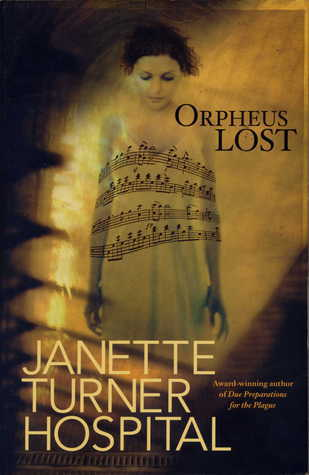Orpheus Lost by Janette Turner Hospital
London: Fourth Estate, 2007 ISBN 0732284414
Those few of you who regularly read my reviews know that I've set myself a task to read more Australian female authors, and looking back I've covered a bit of ground - Thea Astley, Kate Grenville, Delia Falconer, Elizabeth Jolley, and Shirley Hazzard have all been read so far, with greater or lesser enjoyment. One writer who has eluded me until now is Janette Turner Hospital. She has been on my reading radar for a long time, since the late '80s in fact, but it is only now that I have got around to one of her books. So many books, so little time...
Orpheus Lost is, at base, a story of love, loss, and obsession. We follow the story of Leela, a mathematics academic from the Deep South, who when in Boston meets and falls for Mishka Bartok, a musical genius and ingenue from the Daintree in Queensland. Mishka can only really express himself through music, specifically violin, which comes from his mother's family (Jews who fled Europe after World War Two), and oud which comes from his father's Middle Eastern roots. Mishka has never met his father, whom he believes is dead, and takes up the oud in homage to his memory.
Mishka's world is turned upside-down when a fellow student, an Islamic radical, not only announces that he knows who Mishka's father is, but that he is still alive and living in Beirut. Mishka leaves Leela to find out if this is in fact the case.
Meanwhile Cobb Slaughter, Leela's "blood brother" from her hometown Promised Land, has come back from Afghanistan (where he won a Bronze Star, but also engaged in unauthorised activities) and is working for the Government as a private intelligence operative. Mishka's entanglement with the Islamists has led Cobb to him, and to Leela, who he has loved his whole life, and to whom he wants to cause as much pain as he can.
These plot-lines become more entangled as the story progresses. Leela, who escaped her father's religious insanity, comes to realise through her own loss how the loss of her mother unhinged her father. Cobb comes to realise that seeking revenge is not worth it, and that causing pain just increases the amount of pain in the world. His guilt costs his own life, but saves Mishka's.
Whilst the premise of this book is perhaps hard to believe, Hospital's writing is so effective the reader suspends disbelief almost immediately. Her evocation of the Daintree in particular is lush and rich with visual imagery. In a book where it can be hard to decipher truth from fiction and dreams from reality, Hospital carefully weaves the storyline through multiple lenses, such that the reader is never sure what might be coming next.
The title of the book, and the fact that Mishka plays music of almost unbearable sadness, refers the reader to the myth of Opheus and Eurydice. I'm not sure that Hospital has drawn that link in a way that is too meaningful, and her intent is unclear to me. What she has done is evoke in a powerful way how what happens to us can stay with us, sometimes not for the reasons we might think, and that the human heart makes us work in strange, dangerous and self-harming ways. She reminds us that even in happiness the seed of sadness lurks, and that sorrow can be a very powerful emotion.
Orpheus Lost is a powerful and well-written novel. I can highly recommend it.

No comments:
Post a Comment